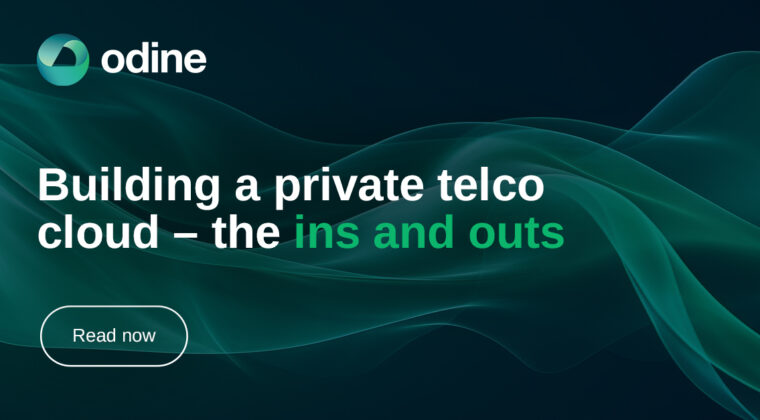Traditional CSPs should not disregard the inherent value of a private cloud. Despite the rise of hyperscalers and public cloud offerings, this proven strategy reliably delivers on performance, cost, and security. When deployed correctly and customized for a telco’s specific needs, a private telco cloud can offer the same, if not more, benefits than the public cloud.
In this article, we discuss the benefits of a private cloud today and what factors telcos should consider when deploying a private cloud that works for them.
What is the private cloud?
A private cloud, exclusively dedicated to your organization, ensures singular access and control over its computing resources, distinct from the public cloud, which is shared infrastructure accessible to multiple entities.
It can be customized to your security, commercial or service needs, and delivered through a secure private network. Having complete ownership of your cloud environment empowers organizations to strengthen access controls to their data, and it also gives them greater visibility over their infrastructure, operations and network performance.
This aspect frequently stands out as the primary selling point for telecommunications companies opting for a private cloud solution.
The reasons to consider a private telco cloud
Although the public cloud is an increasingly popular choice for telcos, especially since hyperscalers disrupted the market with low-cost, low-maintenance and highly scalable solutions there are many scenarios when a private cloud is the more suitable choice and can add to your business value.
A private environment is dedicated to your organization and your use cases, meaning it can be heavily tailored to your demands and more closely monitored and controlled.
Here are some of the primary benefits of a private cloud for telecoms:
- Telcos own their data and IP, which means they can secure their competitive advantage
- Maintain direct communication with customers
- Use a single vendor to reduce complexity
- Securely host radio, core and transport networks to protect integral business functions
- Stronger security and greater control over IT workloads reduces risk of breach
- Greater visibility over activity improves risk monitoring activities, such as fraud management
- Independent control improves operational efficiencies
- Advanced data center technologies can be used to enhance performance
- Greater reliability for high service-level performance
- Scalability and flexibility to responsively meet customer and network demands
Read more about why telcos may choose a private cloud over an outsourced public cloud
Considerations when configuring a private telco cloud
Where to host a private cloud
A private cloud can be hosted by the cloud provider in a third-party data center or managed by the telco on-premises. If hosted externally, the telco still gets exclusive access to the resources, but the maintenance and upgrades are managed by the cloud provider.
Hosting a cloud on-site gives you the control to customize compute, storage, and network resources and may give heavily regulated organizations the additional peace of mind their data is secure.
Outsourcing the management of your private cloud gives you the best of both the private and public cloud. It gives telcos the benefit of ownership and control, all while minimizing OPEX, reducing hardware and enabling agile growth. This may be most beneficial to organizations who want to draw on the expertise of a provider whom they can trust to support cloud infrastructure management, technical requirements or, in some cases, strategic decision-making.
Application development requirements
Telcos have been redefining their place in the telecoms market. The private cloud can help them protect their USPs, their unique data, and their value. However, telcos don’t want to dismiss the flexibility that public cloud options can offer.
This can be solved with the use of virtualization, management software, and automation. By virtualizing the private cloud, telcos can maximize operational efficiency and make scaling resources or adding new innovative technologies possible.
Equally, a robust management solution will allow you to centralize control to optimize resource allocation.
The other solution is choosing a strategic partner for a hosted private cloud. A strategic partner will provide more than cloud access – it will help to manage resources efficiently and enable scalability and will support you in creating a roadmap for infrastructure growth. Not only will it take care of regular updates and upgrades to keep technologies up to date, but it should manage the adoption and integration of new capabilities and services.
This approach ensures telcos using private clouds can grow, adapt and scale with the agility that today’s markets demand.
How to leverage the private cloud
Looking at the long-term total cost of ownership (TCO), a private cloud has its benefits. Keeping certain data center applications, such as containers, service meshes, or customer data, in the private cloud makes financial sense. In fact, the public cloud is proving to be less suitable than people may have hoped.
In the UK, 25% of organizations have moved half or more of their cloud-based workloads back on-premises and 93% of cloud leaders involved a cloud survey were involved in a repatriation project.
The top motivations more this move are security issues and high expectations for performance, compatibility and downtime, amongst others, not being met by the public cloud. In addition, cost is proving to be an unexpected issue. As attested to by many enterprises and telcos, public cloud invoices are on the rise, especially when telcos try to lift and shift legacy applications to the public cloud. There are also more cases of companies de-clouding from public clouds aka public cloud repatriation.
In short, the public cloud is not the all-in-one solution people thought, and private is simply more suitable, or the only viable option, for certain workloads. Telcos with a high volume of network functions or traditional infrastructure patterns will see better performance and lower OPEX in the private cloud.
It’s tailor-made for services that require low-latency, high security, and ultra-wide bandwidth, such as industry 4.0 or critical national infrastructure or autonomy.
The private telco cloud already contains the necessary features for enabling these use cases.
Supporting future roadmaps
Telcos must look to the future when considering their private cloud. For example, investment into edge. Telcos with edge in their strategic roadmaps should think about how they can leverage their existing infrastructure to support this. If they chose to deploy edge placement solutions with the public cloud, this could require significantly more resources than simply exploiting existing edge computing enablers.
Discover private telco cloud with Odine
Odine is an expert communication solution provider with extensive experience building cloud infrastructures with our partners. We offer private telco cloud hosting alongside strategic consulting, so we can build the virtualized ecosystem that will support your organizational growth.























